As we pen the final French Lessons post for the summer of 2021, let’s first review where we’ve journeyed in this off-kilter season – and to newcomers who stumble here in the cooler months, we say a hearty “Soyez le bienvenu!” Welcome!
- We first reunited with Bellevue, our quirky, summer home in Antibes (even though an important part of us never had left) in Rebonjour: From My Eclectic Pandemic Muse.
- Soon we were strewn with all sorts of luck – because la chance, en français, is just as sweet – but we spent our good fortune too quickly in Luck in Antibes: It’s Not for the Birds.
- We fixed a strange cut in Bellevue’s electricity using the custom of social ties in Domotique: Small Firms Light Up French Life.
- We then mourned the Côte d’Azur’s famous restos de plage and tried to understand the rationale behind their demise in Why Is the Riviera Razing its Beach Restaurants?
Around the time of that second post, when a seagull was unloading its viscous luck over my husband Philippe’s unsuspecting head, our daughter Lolo was searching online for a summer French class. She still has two years left in high school, but we heard that universities like to see at least a couple high school language credits.
It’s not that Lolo doesn’t know French. Au contraire. When she was only four years old, she’d flounced up to me in our kitchen one evening and for some odd reason declared, “Maman, il faut que je sois sage.”
At the time, this maman had been struggling to learn the tyrannical French verb formation called le subjonctif. I’d stared down at my toddler. “Did you just use the subjunctive?”
Lolo flinched. She didn’t know what the subjunctive was. She didn’t even know what a verb was. She didn’t know why Mommy sounded so serious either, but she did know that she was supposed to be sage, a very French vocabulary word that describes the wise and well-mannered behaviour expected of French schoolchildren.
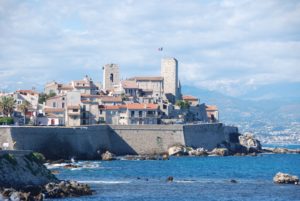
Now a dozen years later, Lolo has never stopped speaking French. (All things considered, she’s pretty sage, too.) Her français sounds like that of a native. It’s just those bizarre spellings and pesky little accents that get in the way of writing – and so earlier this summer, she was scouring the internet for an appropriate high school French class.
Her high school counselor kindly met with us online even after we’d arrived in France. “If you want to do a French course this summer, that’s great,” she told our 16-year-old. It was the straightforward way to approach university applications. “Or,” she said, “if you’d rather learn by immersion while you’re in France, that works, too.”
Lolo swiftly abandoned the research. Instead of summer bookwork, my teenager wandered Antibes’ ancient streets and did archery with her friend Clotilde. She surfed and cycled and strolled the long, tidal beaches of Saint-Gilles-Croix-de-Vie with Éros. She whipped around on inflatable water toys in Villeneuve-Loubet with Ilan and played majestic piano music with him back in Antibes. She swam and yakked with her friend Kaiya, and with Spencer she relished a teens-only night out in Nice and kayaked in France’s forested Ardèche region.
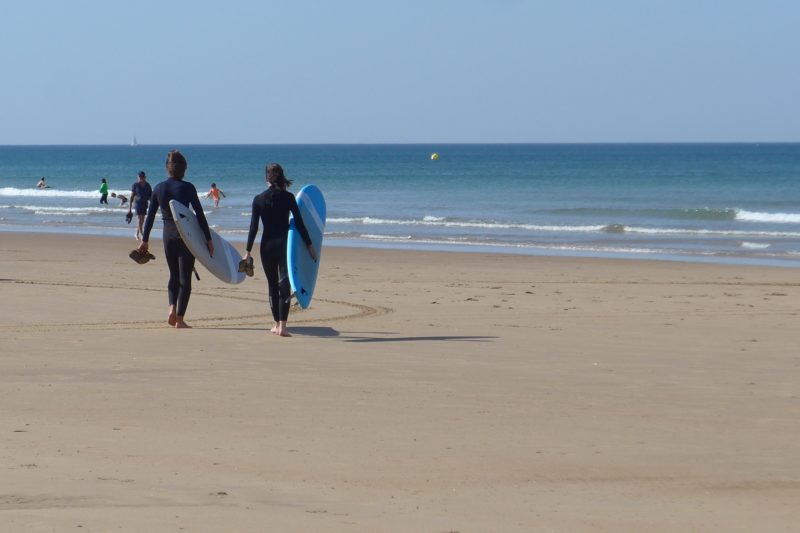
She tried the art of surfing … 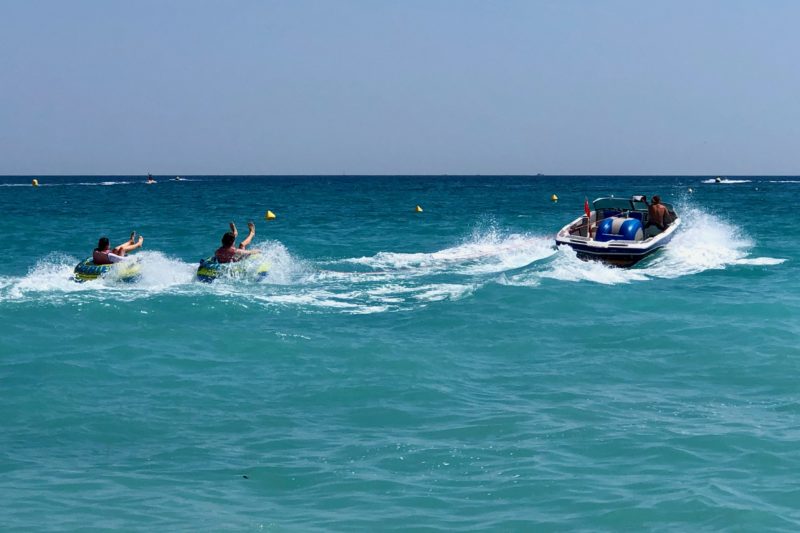
… cruised on gonflables … 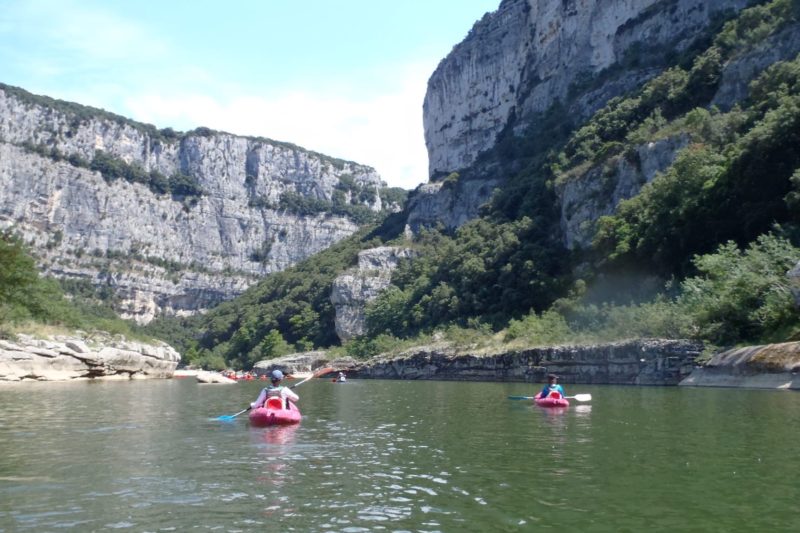
… and kayaked in l’Ardèche.
“Which language did you speak with Spencer and her family?” I asked my daughter when she returned from her kayaking weekend.
Lolo hesitated at my pointless question. “I dunno really,” she said. “A mix of both, I guess.” I got the same answer after her time with Kaiya. English and French were interchangeable with these friends, or maybe they’d mixed the two languages into a lazy franglais.
With the first three friends – Clotilde, Éros, and Ilan – I didn’t have to ask. Their parents would have encouraged English, but for the bulk of the teens’ time together, I knew they would have surfed and cycled, shot arrows, made music, wandered, and chatted en français. Lolo had met each of these friends in preschool, here in the Côte d’Azur. Ilan, in fact, was her longest friend anywhere on the planet; they’d met when they were two. French was the only language these friends properly shared.
“Le temps te construit des racines”: This quote filled a page in a novel I read this summer. What better moment to absorb the wisdom of Antoine de Saint-Exupéry? Time was building Lolo’s roots.
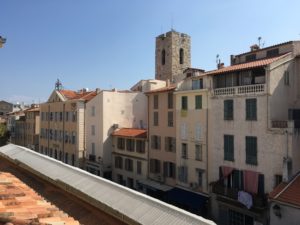
Living in French, though, is more than a language. It’s not just knowing how to conjugate stubborn verbs and tossing out very French words like sage. Once this summer after grabbing a takeaway sandwich at a boulangerie, Lolo glanced back inside at the bakery’s timber display cases and rows of oven-fresh breads. “They should really have casual boulangeries in Canada,” she said, “you know, simple ones like they have here.”
My teenager was developing an appreciation of the culture that she had taken for granted during her childhood immersion. Soon a title appeared on her smartphone: “Things that Europe has that N America needs: A much needed list” and beneath it a tally grew to include better architecture, Carte d’Or chocolat noir ice cream, and –
On a recent drive a question sprang from the car’s back seat. “What do you call rond-points again?” Roundabouts.
Now the summer season has fled, and Lolo’s self-created French immersion class is winding down. One day as we contemplated our return to the other side of the ocean, she said with a chuckle, “Here goes the cultural whiplash.”
I had to laugh. Yes, life would be different back in Toronto, but during this slightly abbreviated and strange summer in Antibes, not only had my kid experienced French life alongside her parents. She had immersed herself in her surroundings, and she’d done so alongside her real, honest-to-goodness, French friends.
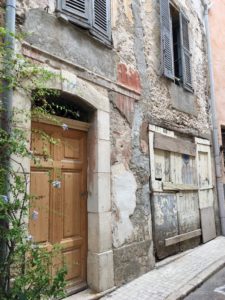
Several years ago, I’d run across an explanation of les relations franco-américaines as posed in The Culture Map, by Erin Meyer, a professor at INSEAD. Like so many good sayings en français, Meyer’s analogy for this cross-border relationship involved food. Americans are like peaches, she said. They are easy to approach and readily offer a piece of themselves, but their inner cores remain well protected. The French, on the other hand, are like coconuts. At first they keep a distance, but if you pierce their shells, they open up with increasing ease, and relationships grow strong and enduring.
Des pêches and des noix de coco: It’s not that one side is superficial and the other cold. Non, that interpretation is frivolous. The French, rather, don’t hurry their relationships, but once you make a friend, you have that friend for life.
Put this way, I suppose my teenager chose well with her French studies this summer. There is, after all, no more abiding education.
French Lessons will return next season, life and regulations willing, and we look forward to traipsing together through the beloved shores of France’s Côte d’Azur. If you’ve found us mid-season, why not subscribe so that next summer we’ll pop automatically into your inbox? In the meantime – and we say this with intent – keep well.
Follow us on Instagram @frenchlessonsblog

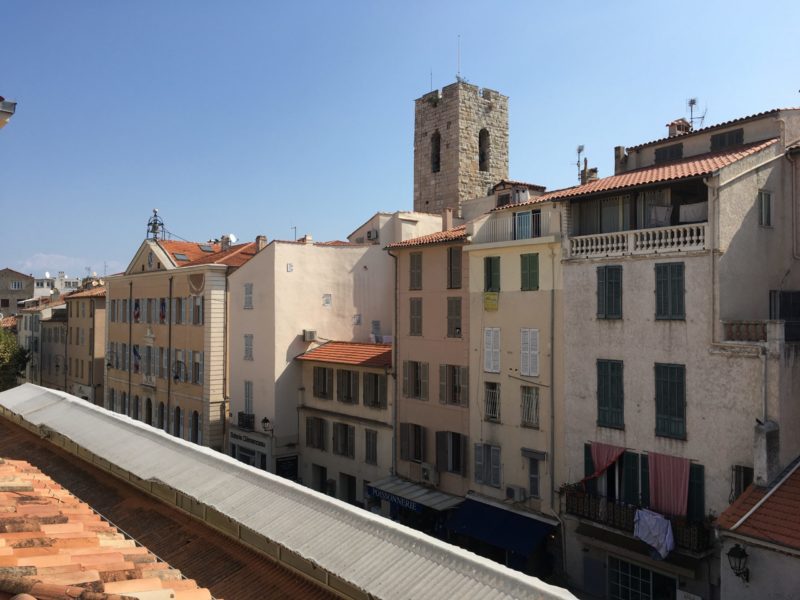
I’m glad you’ve had a nice, if slightly shorter, summer in France, Jemma. Hopefully next year will be more back to normal!
All the best
John
Merci, John...comme d’habitude for the whole planet!
I have enjoyed each and every post. What a wonderful gift you have given Lolo!!! I look forward to next summer.
Thank you, Angela, for your ceaseless support and appreciation. It means a bunch to me.
Like to add a fruit – your stories are like apples. Sweet and juicy to the core 🍎
Love it, Susie! Merci beaucoup. J’ai dû me presser le citron [I had to rack my brains – or literally I had to squeeze my lemon] to come up with a fitting response. 😊
Always enjoy your scribes during the summer it is a break from my work day Do have a safe trip back to Toronto
Laura
Merci, Laura. Thanks so much for joining in as you do so regularly!
It’s always good to get a glimpse of life in Antibes through your eyes…and today through Lolo’s. I agree with her about the architecture. Safe travels back to Canada!
Thank you, Barb … yep, me too! Even the crumbling plaster and half-chewed shutters on old French buildings have a certain charm!
Thanks for sharing. Hope the cultural whiplash is less severe for Lolo this year.
I love that phrase, right? I have been told that something-“whiplash” is part of modern teenage phraseology. 👍
Peter Mayle’s “A Year in Provence” was my favorite in describing les relations franco-anglais. Jemma, you are the new Mayle!. I will be patient for yet another season!
Wow, David, just wow. Gros merci. In the spirit of Mayle and his gorgeous, leisurely mealtimes, I will dine out on your words at lunch and take them straight to the dinner table! Thank you.
Dear Jemma, Even though the pandemic still restrains all the freedom and pleasure that we can’t wait to see coming back, I am sure that you have fully enjoyed your stay on the beautiful Côte d’Azur. As for Lolo and yourself, you should be proud of handling so well «la langue Française» and believe me, it’s already a lot better than what many French Canadian do !
Ha, thanks, Andy! Yes, I’ve learned to take le beloved subjonctif in stride. Someone told me that even the French don’t use it properly. 😁
That was a beautiful read…. till next year…. and more hidden garden restos x
Thank you, Rae. And yes, à la prochaine! J’en ai deja hâte.
peaches and coconuts. I love it! But I especially love Roundabouts!
Merci, C! And truth be told, French rond-points themselves are interesting! They often have their own name in France, sometimes an adornment at the centre, a sometimes-different execution theory than British ones (which I figured out belatedly) – and of course they work in a counter-clockwise direction. Maybe a post one day…
A lovely closing to the season. I will miss your whimsical yet profound commentary…jusqu’à l’année prochaine mon amie Jemma.
Oh, merci, Electa – et oui, jusqu’à l’année prochaine. Thanks for being such an active part of this community!
I’ve so enjoyed your reflections this summer and can’t believe that your communications are already over for this year. I’ll look forward to next year’s descriptions of life and history in Antibes, and wish you and your family continued good health and happiness.
Thanks, Barbro. Yes, the time-disconnect in our days is incredible at the moment, and I can’t believe “there went the summer” either. Thank you for being such a devoted reader. À bientôt.
Oh my, the summer ends so quickly. I tend to agree with Lolo’s high school counselor there is nothing like in situ for learning a language and copping skills. Bon retour au Canada!
Merci, Carolyne, and we hope that you are able to continue your own in situ experiences in Provence. As you say, there’s nothing like it. Bonne rentrée!
What, already?? I feel like you were barely getting started and poof, September is around the corner! As always, I just savoured these precious morsels of la belle vie as they came, each one unique, each one insightful, evocative. Un gross merci to YOU, my dear!!! oxoxoxoxo
Thank you so much for these delicious words, Tracy, and for the encouragement you have offered all along this meandering path! Et oui, I’m already looking forward to next summer…
Il y a bien quelque chose que l’anglais a et que le français n’a pas : “cultural whiplash”. C’est génial, puissant et ça frappe sec comme le coup du lapin. La traduction française en “choc culturel” est bien pauvre à côté de ce qu’évoque l’expression anglaise. Bravo à Lolo. La littérature anthropologique est pleine de références au cultural whiplash. Mais déjà au 16e siècle, Montaigne réfléchit sur le choc que représente la découverte des Amériques et se pose la question de savoir qui des cannibales ou de nous est le plus humain. Plutôt que de juger et conclure, il nous invite à repenser notre humanité dans un cadre plus grand. Le cultural whiplash comme point de départ d’une réflexion sur soi… that sounds good.
Merci d’avoir élevé notre discussion, Diane! Tes réponses me font toujours réfléchir. Oui, l’anglais propose souvent des phrases “punchy,” mais le français, c’est de la poésie; les cartes de ces restaurants sont toujours meilleures! Si nous entrons dans le monde de l’anthropologie, c’est encore mieux car Lolo suivra un cours d’anthropologie cette année. On verra…
As always, it’s been lovely reading your summer blog. And I completely agree with L — we need more roundabouts in North America!
Thanks very much, Virginia. And I agree too!
I subscribed to French Lessons a few years back but for some reason had stopped receiving the posts. Now that I’ve found your 2021 entries (and read them all in one go), I’m both happy and relieved to learn that you were able to return this year — especially because my husband and I are headed to there in a few days, for our 4th or 5th visit. You do such a marvelous job of capturing both the magic and the quotidian. Looking forward to your book!
Anne, this comment absolutely makes my day. Merci! I’m delighted that you enjoy these posts and that the cyber world has somehow reconnected us. You bring up a great point, and one that has infuriated me from time to time, but emails about new posts have been arriving in subscribers’ junk folders! I’ve done my best to fix the issue, but sometimes google et al feel they know better. Perhaps our particular communication hiccup a few years ago coincided with a change of my administrator email address (which I’d been forced into thanks to a hacker). Whatever the situation, it’s wonderful to hear from you again. I am very grateful for your comment and continuing interest. And enjoy your upcoming time in Antibes! I hear it is absolutely gorgeous at the moment.
Loved following your adventures this past summer, and am looking forward to hearing what you’re up to next year!
Thanks so much, Avery! Really thrilled to have you aboard. And next summer – yes. It all feels esoteric at the moment, but oui, certainement, we plan to be back!